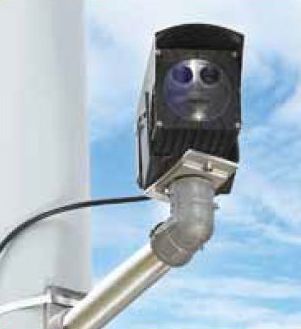INDIAN RIVER SHORES – The same type of stealth security cameras that protect Washington, D.C., and Wall Street might soon keep track of everyone who drives into or out of the Town of Indian River Shores.
At a recent budget workshop, Chief Bill Schauman asked the Town Council for $50,000 to acquire two automatic license plate readers.
One would be perched at the north entrance to the town on A1A and one at the south entrance.
The cameras would be bought sometime after Oct. 1 when the new budget year begins.
Schauman said the machines would read the license plates, retrieve information about the vehicle and driver, and report back to officers’ on-board notebook computers in real time.
“They would be at both ends of town and if anybody’s wanted, we’ll be notified instantly,” Schauman said.
Officers would also be alerted if a vehicle was stolen.
Though the devices are used in some places to catch drivers who have run red lights or violated other traffic laws, there was no mention that they would be used that way in the Shores.
The cameras would be used as a crime-prevention tool, as Highway A1A is a popular pass-through route for residents, tourists and service vehicles.
“We’ll have this town locked down,” Schauman said during the budget workshop.
“The town is very conducive to that – one way in and one way out,” Councilman Jerry Weick said.
Actually, there is one additional way into Indian River Shores via the lightly used Jungle Trail entrance off Route 510. Weick also mentioned that the cameras sounded like “big brother watching.”
Civil liberties advocates have challenged such surveillance in other cities and counties in Florida, sometimes with litigation.
“That’s why people don’t like it, but in this community, I think people will like it,” Schauman said.
Devices similar to the ones the town is looking at have been installed and used at some point in Clearwater, Fort Lauderdale, Miami, Jacksonville and on Florida’s toll roads to enforce tolls associated with E-pass programs.
Schauman acknowledged that in some locales, the cameras could be considered controversial. But in the Shores, he felt, residents would see that the public safety benefits of the cameras greatly outweighed whatever infringement on privacy which might be perceived.
The British have used these types of cameras since 1997 for counter-terrorism efforts against the Irish Republican Army and the Italian government recently installed a network of cameras to monitory its highway system, but the devices were outlawed in Germany in 2008.
Lawsuits in the United States stem from privacy issues and from the technological limitations of the readers – that sometimes similar letters like D, O and Q can be misread, leading police on a chase after an innocent driver.
The capital request, which was one of about a dozen pieces of equipment and vehicles being sought by the Public Safety Department, prompted only minimal discussion at the council workshop.
There was no vote required, but no major objections were raised, although Councilman Dick Haverland asked Schauman to bring back some endorsements or testimonials from other towns or cities already using the cameras.
The idea received nods of acquiescence and one supporting comment from Councilman Mike Ochsner.
Captain Robert Stabe said the public safety department is looking at two different camera manufacturers.
The Federal Signal Spike HD fixed camera system, www.federalsignal. com/ and the ELSAG North America FPH 900 fixed camera system, www. elsag.com.
According to the manufacturer’s website, the Spike HD model is a ruggedized, self-contained camera that operates in “total darkness, bright sunlight, or adverse weather conditions” by using both light and infared technology.
The camera weighs less than seven pounds. It can withstand a wide range of temperatures, from minus 4 degrees Fahrenheit to 140 degrees Fahrenheit.
The ELSAG cameras have similar features.
“The ELSAG North America is the one that I’m going to push for because they make every single component themselves,” said Capt. Robert Stabe, who has researched the cameras along with Chief Schauman.
“They make cameras for the military, they’re everywhere.” The ELSAG cameras have made the news from Arizona to New York and have helped law enforcement not only apprehend criminals but also solve open cases and locating important evidence. If the technology worked out to be an effective tool, the town could, down the road, purchase a mobile unit which could scan license plates in parking lots or in traffic within the Shores.
In 2008, an ELSAG mobile plate reader led police in the Bronx to a stolen car in a parking lot where they ultimately found a body in the trunk.
The ELSAG website states that the Fixed Plate Hunter 900 is a minicomputer, compatible with cellular and Wi-Fi technology.
The website lists applications which include searching for suspended or revoked driver licenses and even expired car tags. The website also offers help obtaining grant funding to assist municipalities in purchasing the camera systems and software.
“We feel that it would be a really positive thing to have, but they’re rather costly,” Capt. Stabe said.
The $50,000 cost would not come out of Shores’ residents property taxes, but instead the money would come out of a fund derived from state cost-sharing revenue.
That money cannot be spent on operating costs such as salaries and benefits, but only on capital items.
The town receives about $400,000 per year from the state for its share of gas excise taxes which are in the infrastructure fund.
Town officials said there is sufficient money in that account to purchase the cameras, though the request was not approved at the June meeting, as other requests for vehicles and equipment must be weighed and prioritized.

